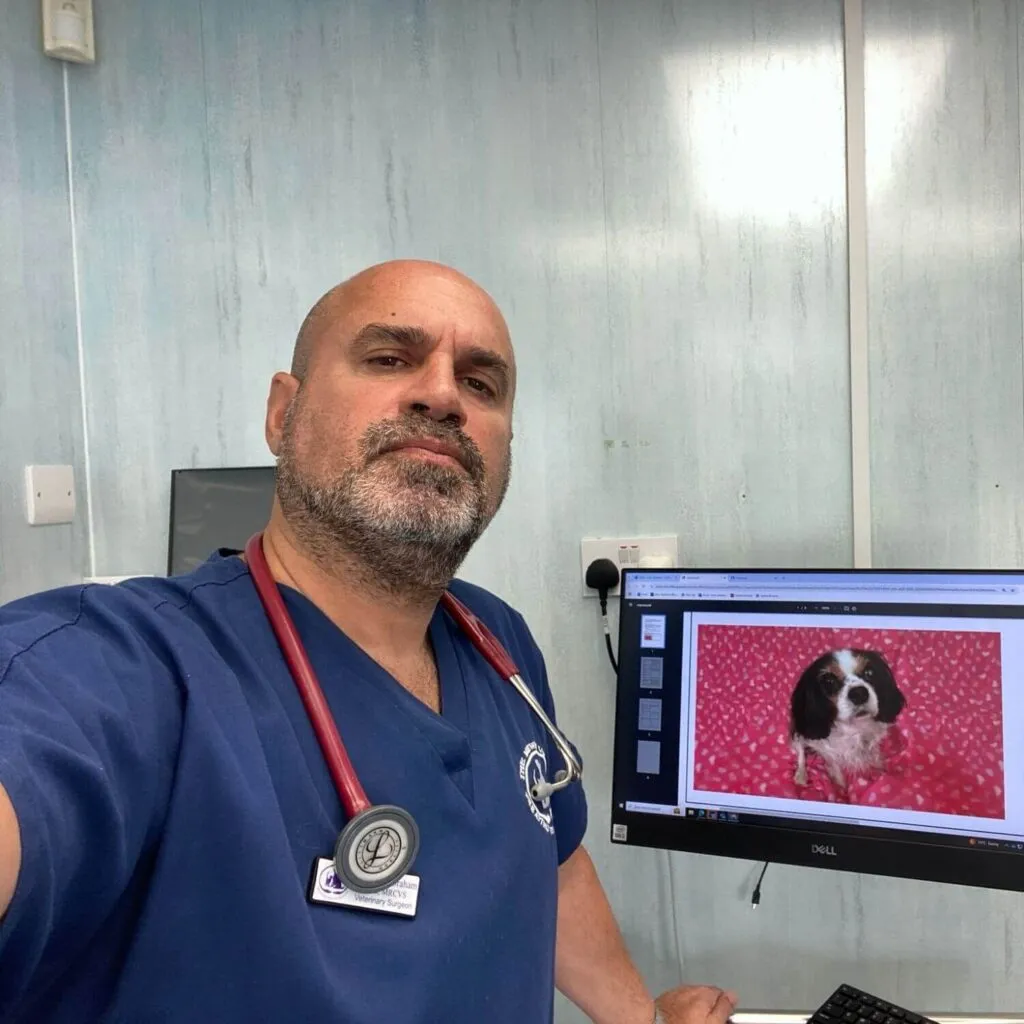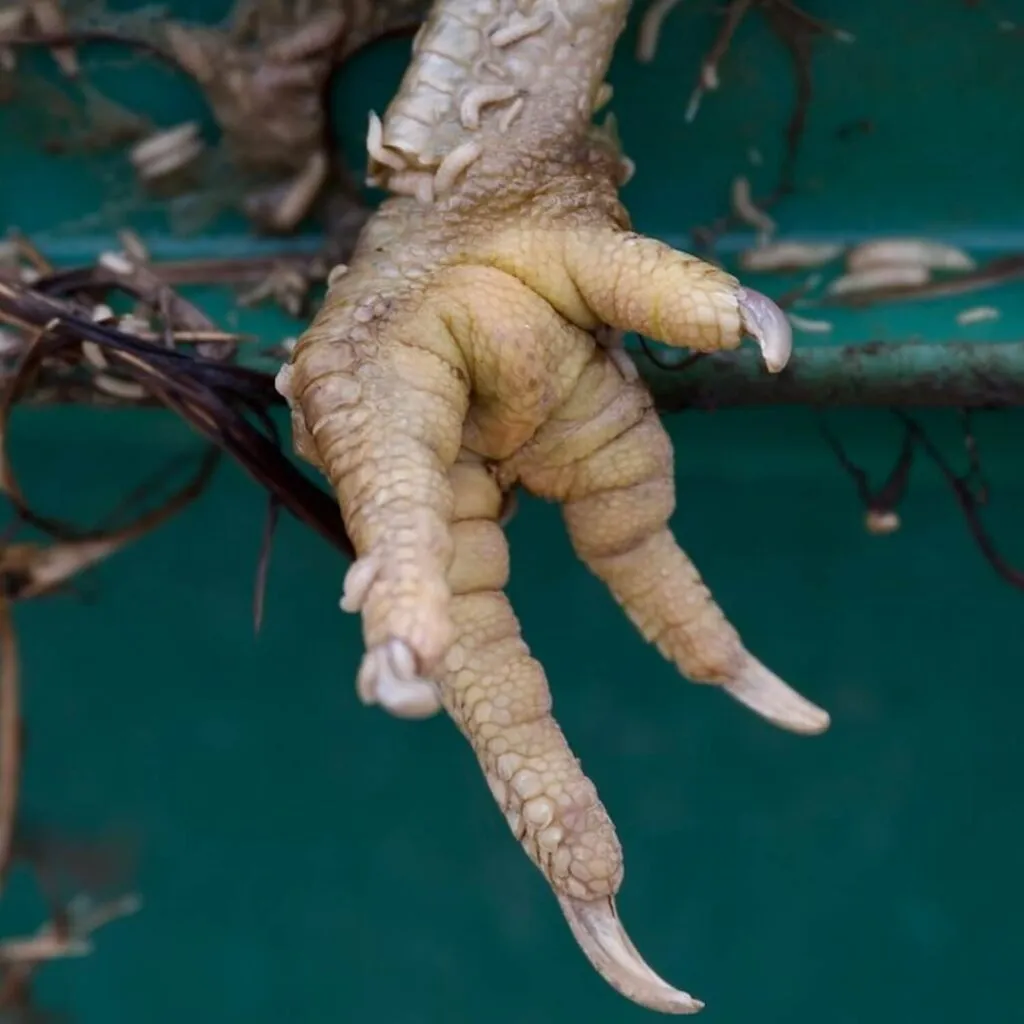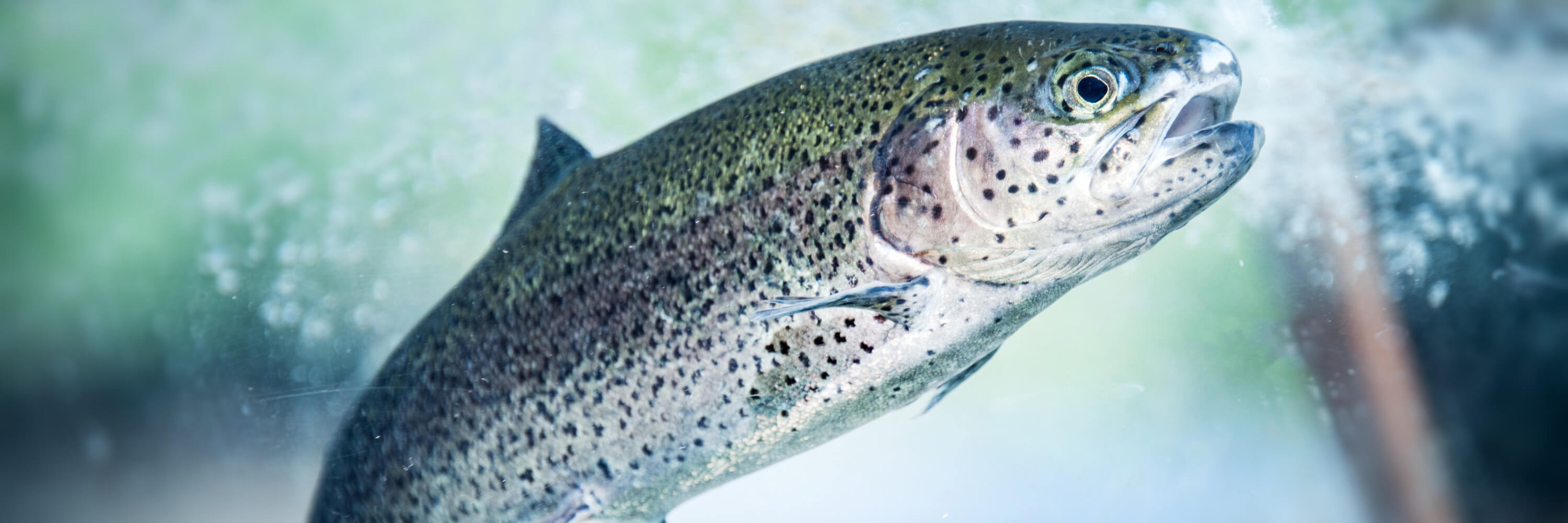
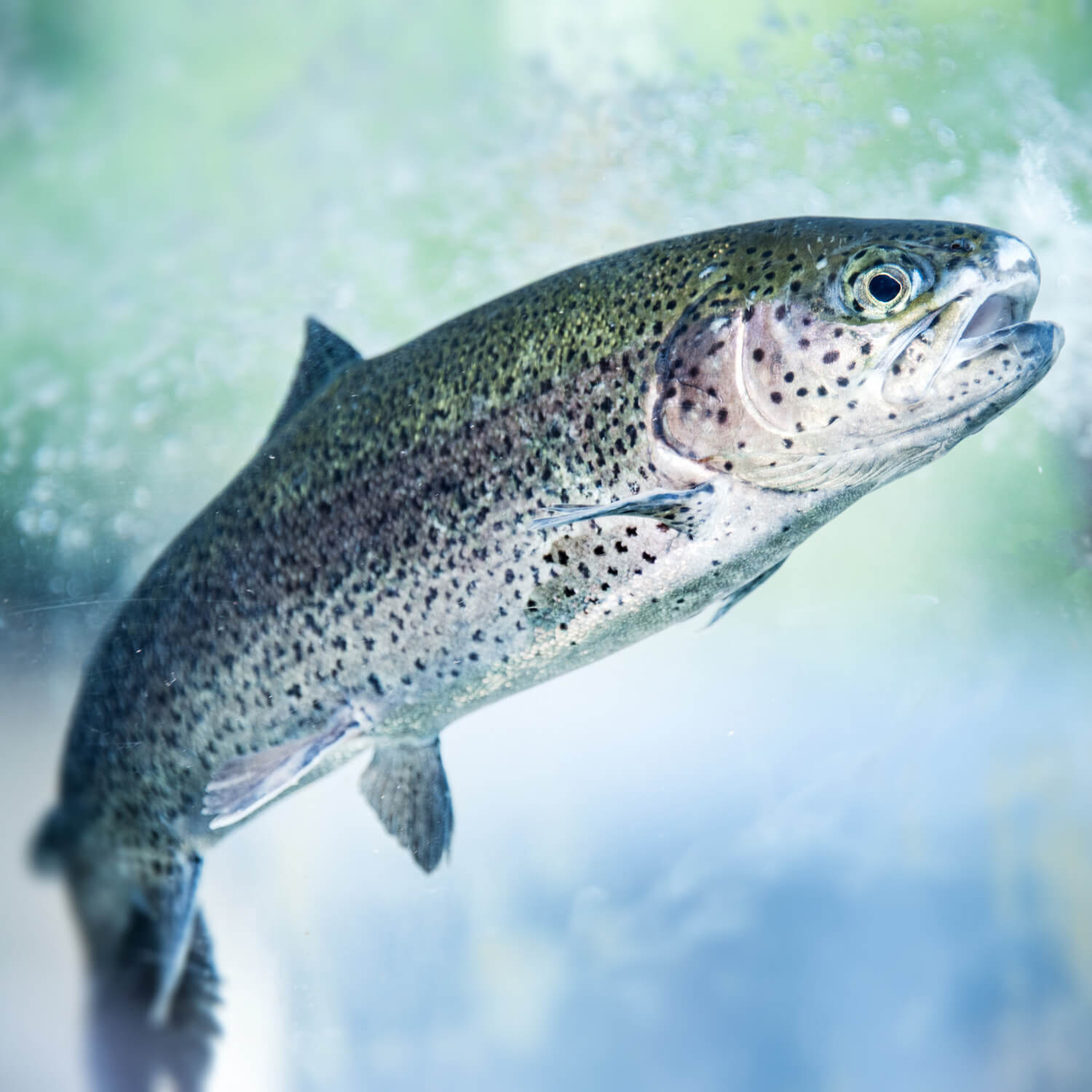
Our Top 10 Moments For Animals In 2023
Our estimates suggest that in 2023 we impacted over 34 million animals worldwide!
This was a huge joint effort and I am so grateful to my extremely hard-working colleagues, both in the UK and around the world for their dedication and passion.
We also could not have achieved so much without the crucial support we received from experts, celebrities and politically-influential individuals, who allow us to speak with authority, spread awareness and keep important issues in the public and political eye.
Above all, I want to say a huge thank you to our supporters and donors who are reading this. We are a charity, so we quite simply would not exist without you. By making donations, attending demonstrations, signing petitions, reading and sharing content and taking online actions, you’re at the heart of all the incredible things we have achieved for the animals.
Here are 10 of the biggest moments for animals in 2023, including historic new laws, groundbreaking investigations, and major campaign milestones which take us closer to achieving even more progress for animals in the future.
1. Fish Slaughter Boat Investigation Release
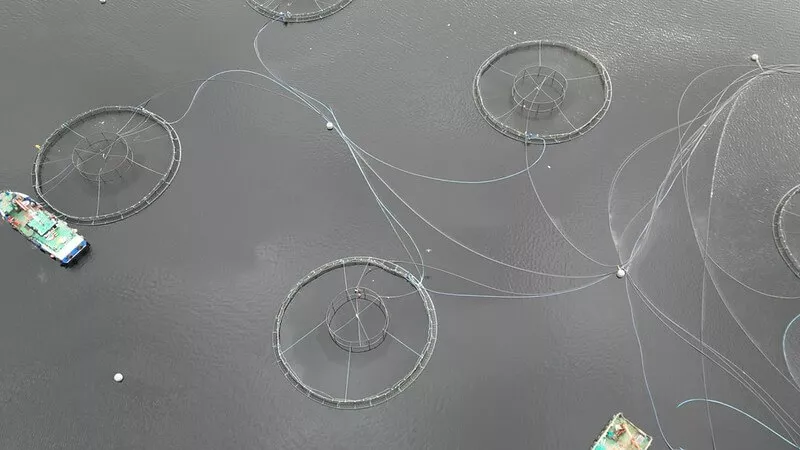
In February, Animal Equality released disturbing footage evidencing widespread mistreatment of trout and salmon on slaughter boats along the Scottish coast. The footage documented various abuses, including failure to stun fish properly, overcrowded nets, violent handling by workers, and the disposal of dead fish overboard, posing a biosecurity risk.
The release of this footage marked a crucial step towards securing increased legislative protections for farmed fish who are trapped in this cruel system every year, and encouraged consumers to learn about the true plight of farmed salmon. The revelations garnered significant media attention and our findings featured in The Independent, Yahoo News UK, and The World News. Renowned fish experts, Dr Lynne Sneddon and Mark Borthwick, expressed shock, with Borthwick describing the footage as “among the very worst instances of fish abuse [he has] seen in [his] career.”
This impactful investigation paved the way for subsequent successes in 2023, including a 10-minute televised segment on the BBC. We also took this year to release continued exposés revealing that millions of salmon are dying on farms due to predation, disease, lice outbreaks and rough conditions. These efforts, alongside our political lobbying strategies, played a pivotal role in encouraging the influential Government-advisory body, the Animal Welfare Committee, to adopt all of our key recommendations for farmed fish legislation during its private Government consultation. Thanks to our legal advocacy, alongside other animal advocates, the Committee has recommended that the UK Governments introduce mandatory CCTV in fish slaughterhouses, increased inspections, enhanced transparency, and stronger law enforcement. While the best way to spare fish from suffering is to not eat them at all, this important legislative work has the potential to meaningfully impact the lives of millions of farmed fish annually.
2. Mexico City Banned Backyard Slaughterhouses
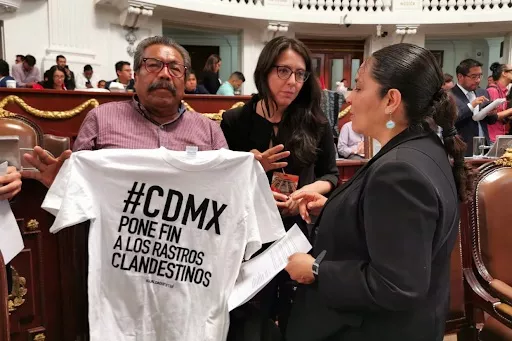
Animal Equality’s advocacy efforts in Mexico have yielded groundbreaking successes in the ongoing fight in defence of farmed animals.
On 2nd February the Congress of Mexico City, following relentless campaigning by Animal Equality, passed legislation to outlaw ‘clandestine’ or ‘backyard’ slaughterhouses.
These slaughterhouses were facilities that were not approved and operated unofficially or in secrecy. Since 2016, Animal Equality’s extensive investigation work has exposed widespread horror, cruelty and neglect at 34 slaughterhouses in thirteen Mexican states.
The legislation in Mexico City imposes fines and up to 2-4 years in prison for operators of backyard slaughterhouses, marking a pivotal victory for animal protection. A ban in the country’s largest city is a crucial step towards addressing the rampant abuse, which impacts millions of cows, pigs, and chickens that are killed in such facilities across the country.
3. Mexico Set To Change Its Constitution In Historic Progress For Animals

With two of our top stories this year, our team in Mexico has been on a tour de force. We played a key role in a move that could change Mexico’s constitution!
Currently, Mexico lacks a comprehensive animal welfare law covering farmed animals, leading authorities to routinely overlook abuse in factory farms. We are campaigning at the national level for an overarching animal protection framework for all animals. We must help the animals trapped within these brutal industries.
Last December, we teamed up with Federal Deputy Fausto Gallardo García of the Green Ecologist Party of Mexico. Together, we unveiled proposed legislation that would modify Article 73 of the Mexican Constitution and give Congress the power to create national animal protection laws that supersede state and local regulations.
In March this year, the Congress of Mexico overwhelmingly supported our initiative! This massive accomplishment resulted from months of dedicated efforts from our Mexican team, our political partners and over 100,000 supporters who signed the petition.
We still have some distance to go, because the legislation will still need to pass through the senate. Watch this space, because this has the potential to fundamentally change the country’s constitution and better protect all animals in law.
4. EU Takes Step Against Fast-Growing Chickens
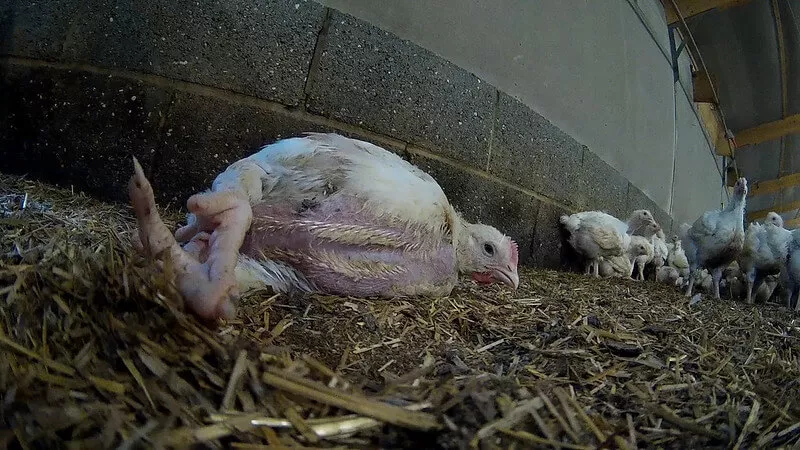
Closer to home in Europe, billions of chickens are suffering every year because the meat industry has bred them to grow at an unnaturally fast rate. This causes them to suffer from a number of serious health issues including heart attacks, organ failure and debilitating leg deformities.
As we have shown through our investigations in the UK and across Europe, fast-growing chickens suffer terribly during their short lives.
The best thing we can do as consumers is to stop eating chickens entirely and end their suffering through our dietary habits.
Another way that we can help these animals right now is by leveraging the legal system and that begins with a ban on the breeding of faster-growing chickens.
That is why we filed a petition calling for an end to the use of fast-growing chicken breeds in all 27 EU Member States. We believe the very existence of fast-growing chickens is a breach of European legislation which requires full consideration to be given to animals’ needs.
The European Parliament received our petition and invited us to Brussels to speak to the Petitions Committee. Our message was very clear: ending the suffering of fast-growing chickens must be one of its priorities.
Over the last year the EU Petitions Committee gave its support to our petition by allowing it to remain open longer, and the EU Commission has agreed to look further into fast-growing breeds as part of proposed revisions to animal welfare legislation.
This is groundbreaking campaigning. Until the last couple of years, no one in the meat industry or the European Parliament really questioned the breeding of these chickens. Now, Members of the European Parliament are speaking up about the issue and the EU Commission itself has acknowledged “that the current animal welfare legislation needs to be updated to take into account the latest scientific evidence”.
5. Actress Diane Morgan Joins Animal Equality at 10 Downing Street
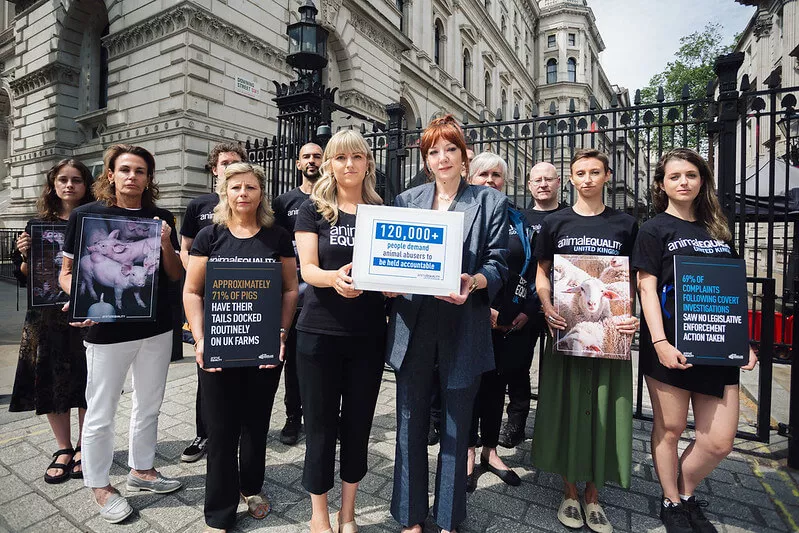
A major focus this year for our team in the UK has been campaigning to close the unacceptable gap between what our animal protection laws say on paper, and the extent to which they are actually enforced. We must make sure that the laws that exist are actually meaningfully impacting farmed animals on the ground!
Late last year, we published a groundbreaking report with The Animal Law Foundation, revealing that fewer than 3% of UK farms are subjected to an official inspection each year. Even more shockingly, fewer than 1% of complaints made about animal welfare led to a prosecution in the UK during the same time-period.
Animal protection laws are being broken time and time again and the Government is failing to stop it.
That is why we launched a petition, which has already been signed by over 120,000 people, to put pressure on the Government to address this injustice.
In June, our supporters took to the streets of London with support from British comedian and Netflix star Diane Morgan to demand that animal legislation is properly overseen and enforced. Together, we handed out leaflets, engaged with the public, and Diane and Abigail – our UK Executive Director – took to the steps of 10 Downing Street to personally deliver the petition signatures to the Prime Minister’s door.
6. Brazil Recommends New Bills
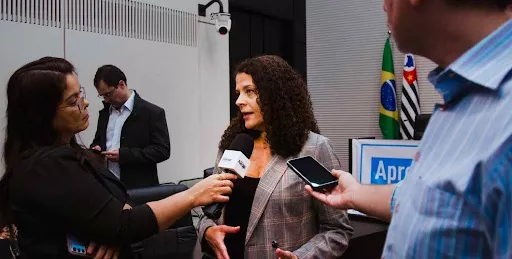
On 27th June, Animal Equality Brazil held a public hearing at the São Paulo State Assembly to discuss four pieces of legislation that would better protect farmed animals in law, including a bill to stop the export of live animals. These animals suffer terribly when transported and are forced to endure lengthy, gruelling journeys that cause them tremendous physical and psychological stress.
If (hopefully when!) these bills are passed:
- Live animal export from São Paulo by ship would be stopped.
- Male baby cows in the state of São Paulo, who are often killed because they cannot produce milk for the dairy industry, would no longer be immediately slaughtered after birth.
- Male chicks in São Paulo, who are subjected to cruel and inhumane practices such as being ground alive, suffocated, drowned, crushed, or burnt because they cannot produce eggs, would be better protected by law.
- Companies would be required to accurately label foods made with animal products so that consumers are informed about the cruel practices involved in their production.
- This legislation could significantly change the tide for Brazilian animals who suffer during transport and in the dairy and egg industries.
7. BBC Countryfile Shares Footage of Dead and Dying Fish
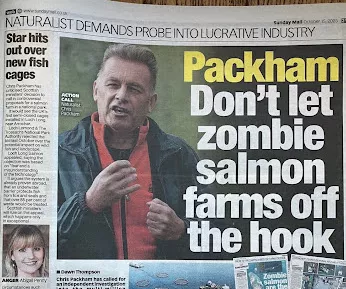
Our UK team has been successfully drawing attention to the ongoing Scottish salmon industry scandal, where millions of fish are dying on farms every year.
Last year hit record levels with more than 16.5 million salmon dying on farms in Scotland – reports show that a staggering one in four fish die on these farms annually. Salmon are dying from rising sea water temperatures, algae blooms, micro-jellyfish, predation, cannibalism, water pollution, antibiotic overuse, disease, and agonising flesh-eating sea-lice infestations. In 2022, according to WildFish, 68% of active open-net farms breached the Code of Good Practice on sea-lice levels.
In September, Animal Equality secured coverage of these challenges on BBC Countryfile.
The episode featured undercover investigation footage obtained by Animal Equality which showed sick and dying salmon floating in the intensive salmon farms. One salmon had a severely damaged eye, while others were deformed and being eaten by lice. Workers were shown to be disposing of huge numbers of dead salmon into bins and trucks.
Animal Equality is demanding a moratorium on the growth of the industry and is calling for no new fish farms to be approved. This increasingly damaging industry must not be permitted to continue expanding.
Our work caught the attention of celebrity conservationist and campaigner Chris Packham, who felt compelled to join us and take action too. Writing directly to our supporters, Chris urged for the public to donate to support our life-saving work and called for an end to the expansion of this “catastrophic” industry.
As reported by the Daily Record – Scotland’s most widely read news outlet – our newsletter led to a tense exchange in the Scottish Parliament between Salmon Scotland CEO Tavish Scott and Labour Member of Scottish Parliament Monica Lennon.
Seeing our work reflected by far-reaching TV programmes, celebrity campaigners and politicians has been a testimony to the power of Animal Equality’s investigations and campaigning work.
8. Investigation Inside Spanish Pig Farm Uncovers Shocking Conditions
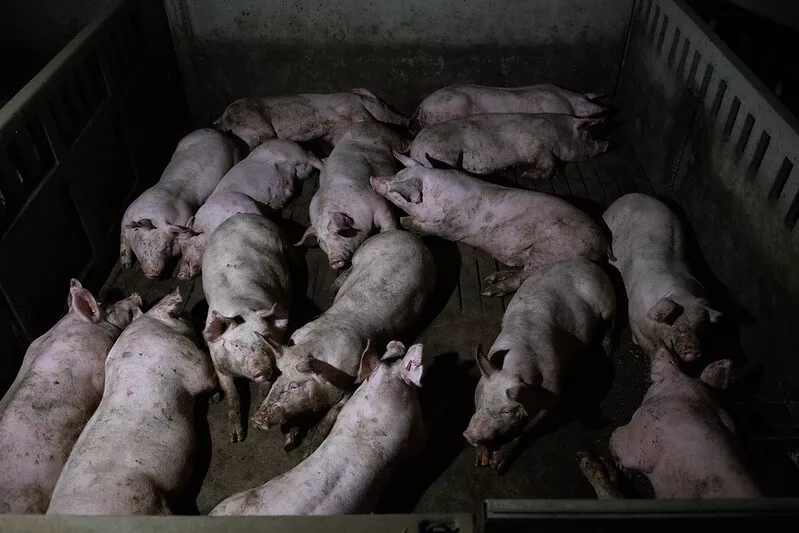
Around 56 million pigs are slaughtered in Spain each year. The vast majority will spend their short lives in brutal conditions inside factory farms.
This is totally unacceptable, and we know that if more ordinary, decent people could see the truth they would agree!
That is why we sent brave undercover investigators into five factory farms in Spain to expose the shocking reality of how pigs are treated.
Our investigative images show pigs being forced to live in dark, cramped and barren farms. The conditions were disgraceful, with dead pigs left among the living and dead rats and maggots were found in various parts of the farm. Pigs were filmed to have stress-related ear injuries, inflamed wounds, and abnormal growths across their bodies. An estimated 10-15% of pigs in Spain die before ever reaching the slaughterhouse.
Following these investigations, more than 150 animal activists joined Animal Equality in the heart of Madrid for a peaceful protest against Spain’s pig farming industry. Together, they carried posters bearing images from these investigations, shedding light on the extreme abuse these pigs experience. They also displayed instruments commonly used to mutilate piglets including tail-cutting instruments, tooth-cutting pliers and ear tag applicators.
Hundreds of passersby paused to view these instruments and speak with the protesters. Our efforts caught the attention of top national Spanish newspapers. This exposure opened the eyes of millions of readers, emphasising the urgency of the situation. It underscored the European Commission’s failure to address animal welfare issues in their 2024 agenda.
9. Animal Equality Prompts Parliamentary Debate on Sale and Importation of Foie Gras
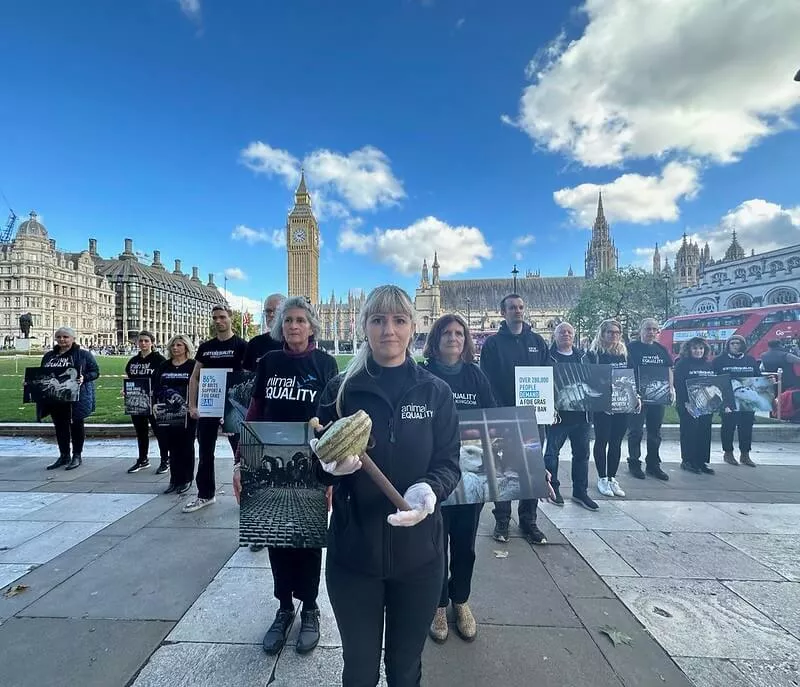
‘Foie gras’ is a French term that translates to ‘fatty liver’. It refers to a ‘delicacy’ produced by brutally fattening up ducks and geese using a feeding tube that is forced down their throats. This process intentionally swells their livers ten-fold and induces disease.
Because of these cruel production methods, it has been illegal to produce foie gras by force-feeding in the UK for over a decade. However, businesses exploit a legal loophole: they simply import it from countries where force-feeding is legally permissible and sell it in UK stores and restaurants, profiting from animal cruelty in the process.
In 2022, the Government tabled a bill which would have banned the import and sale of foie gras produced by force-feeding. The move had widespread public support: a YouGov poll in June 2023 showed 86% of respondents surveyed (excluding the ‘don’t know’ responses) were in favour of a ban, and there are over 280,700 signatures on Animal Equality’s petition.
Despite this, in a disappointing betrayal of voters and animals, the Government U-turned this year and withdrew its support for the ban.
We have been fighting to get the ban back on the parliamentary agenda. In October, we secured the support of Giles Watling – Conservative Member of Parliament – who tabled an important Westminster Debate to revisit the issue.
This thrusts the issue back into the political spotlight. Our supporters amassed outside Parliament showing how much the public cares, meanwhile Giles Watling MP led the charge inside Westminster, equipped with a briefing document prepared by Animal Equality.
The public gallery was packed full of animal activists. MP after MP spoke out in favour of a ban and even Parliamentary Under-Secretary of State for Environment, Food and Rural Affairs (whose role was to represent the Government at the debate) acknowledged the “horrible cruelty” involved, later adding “I would certainly never buy it”.
Key passages from the debate were picked up by local, national and international news: from London’s Evening Standard, to national press such The Independent, The Mirror, The Times, BBC Radio 4, as well as international news giants like Yahoo and MSN. It even reached the pages of foreign news outlets as far away as Malaysia!
10. Meat consumption in the UK reached lowest levels on record
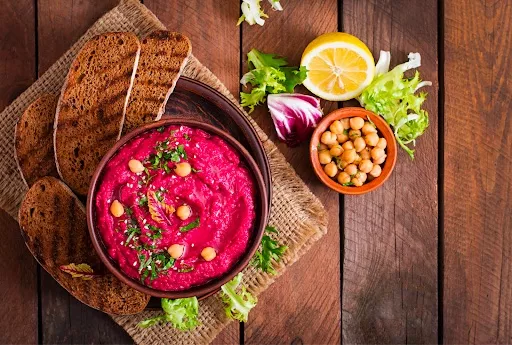
The Guardian recently reported that meat consumption in the UK has reached its lowest levels on record.
Throughout the year, alongside other vegan charities and animal protection organisations, Animal Equality has dedicated significant efforts to encourage individuals to adopt plant-based alternatives.
In the UK, our revamped Love Veg site has been a hub for sharing delicious new recipes and dietary tips, proving that embracing a plant-based lifestyle has never been more convenient or more delicious!
Beyond our Love Veg initiative, we’ve witnessed a surge in pledges from compassionate individuals globally committing to consume more plant-based foods and save animals with every meal!
In the UK, after seeing footage of salmon suffering on Scottish farms aired on BBC Countryfile, hundreds of people took to Twitter to declare that the footage left them “sick to their stomach” and they would be boycotting fish products as a result.
Across the pond in the US, our intensified campaign against cruelty in Denny’s supply chain (an American table service diner-style restaurant chain) led Animal Equality’s President, Sharon Núñez, and Campaigns Manager, Dane Charbeneau, to hit the streets of New York City. Distributing leaflets and showcasing video footage depicting the extreme confinement of mother pigs associated with Denny’s, interviewees said that they would no longer dine at Denny’s establishments until this cruelty was put to an end.
These are just two of many examples which underscore a growing public anger and a heightened seriousness in addressing animal cruelty. With every campaign action, media interview or legislative initiative, we are changing hearts and minds, and saving animals from a lifetime of misery. We will not stop until all animals are free!
Recommended
